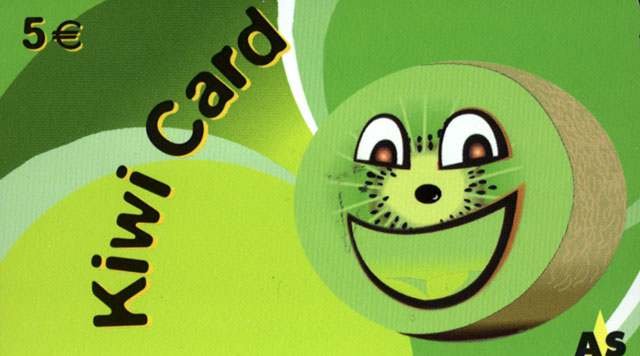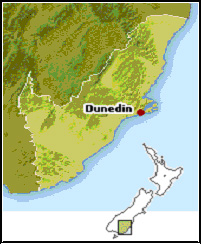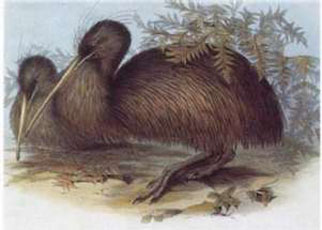
The cheapest phonecard to call Your friend in New Zealand:
Kiwi Card, 5 € for approx. 280 mins (connection fees are deducted)
 |
The cheapest phonecard to call Your friend in New Zealand: Kiwi Card, 5 € for approx. 280 mins (connection fees are deducted) |
Dunedin is a beautiful city located on the eastern coast of the southern island of New Zealand. The city has 110.000 inhabitants and approx. 17.000 students on top of that. The School of Pharmacy has a very good reputation. About 160 students per year are studying at the school that means it is almost comparable in size to the Department of Pharmaceutical Sciences at the Free University of Berlin.

The School of Pharmacy is run by
the Dean Prof. Ian Tucker who is professor in Pharmaceutics. Lecturing is performed
by a number of lecturers and senior lecturers. One of them is Dr. Thomas Rades
who obtained his PhD at the School of Pharmacy/Braunschweig University in Germany
in the Department of Pharmaceutics.
Information about the School of Pharmacy can be obtained at: http://pharmacy.otago.ac.nz.
You’ll find more general information about the so called varsity at http://www.otago.ac.nz.
Very informative, also highlighting the beautiful sights of Dunedin is the homepage
of Dunedin city: http://www.cityofdunedin.com/cover.htm.
Please click this link if you want to get more detailed information
In general New Zealand is a very popular place to go, apart from science this is definitely due to the impressive nature. There is regularly a relatively large number of German students spending 6 months of the pre-registration year in Dunedin, in addition there are also Germans doing their PhD (e. g. 2-3 in the Department of Pharmaceutics). The School of Pharmacy has a “memorandum of understanding” already with the University of Braunschweig, a memorandum of understanding with the pharmacy in Berlin is currently in preparation. Students from universities having such a contractual exchange agreement will be preferentially considered.
Such research stays are currently frequently undertaken, the certificates of Otago University issued for this 6 months period are accepted e. g. by the statue officials (Landesprüfungsamt) in the German county Niedersachsen. It is also accepted by the "Landesprüfungsamt Berlin", but a proof of acceptance needs to be arranged before you leave.
Student fees are applicable and need to be paid to Otago University, however in general the School of Pharmacy arranges this payment via a grant system. Therefore the students do not need to pay these fees in case they are part of the “preferential exchange” (e. g. with Berlin).
The costs of living have to be covered by the undergraduate students. However, there is the possibility to be involved in the organisation and supervision of the practicals of the students and to earn some money. Details have to be discussed with the corresponding supervisor at the School of Pharmacy in Dunedin.
German pharmacy students have a very good reputation at Otago University. Especially their practical experience in laboratory work is very much appreciated. The German system still emphasises very much practical work in laboratories, therefore German pharmacy students are very well trained and can proceed very quickly with practical work in their PhD project. For an overview of the different subjects at the school, refer to the university homepage http://www.otago.ac.nz.
In New Zealand – as in most countries of the world – the PhD students have to pay a so-called “bench fee” to the university. There is a lower bench fee for New Zealand residents, distinctly higher fees apply to overseas students. The annual fee for a New Zealand resident is 16.000 NZ$ (approx. 8000 Euro) per year, about 5000 NZ$ have to be paid by the student, 11.000 are paid by the government. In practice the New Zealand students obtain sponsorships by a grant to cover their contribution to the fee. There is an agreement between the German and the New Zealand government which gives German students the same benefit as New Zealand residents, i.e. the low fee. With support of the School of Pharmacy it could be arranged that the student contribution is also covered by a grant.
If you are interested in working in New Zealand, please contact Prof. Müller directly, preferably by mail (mpharma@zedat.fu-berlin.de) or alternatively by phone (secretary office, Ms. Gabriela Karsubke: +49-30-838 506 96).
Main contact people and potential supervisors in New Zealand are Prof. Dr. Ian Tucker and Dr. Thomas Rades. The contact addresses are:
| Prof. Ian G. Tucker New Zealand’s National School of Pharmacy University of Otago PO Box 913 Dunedin New Zealand tel. +64-3-479 7296 fax +64-3-479 7034 e-mail: ian.tucker@stonebow.otago.ac.nz |
Dr. Thomas Rades |
Dunedin with its 110.000 inhabitants looks very much like a typical English town, of course due to New Zealand’s history being a colony of the British Empire. The lifestyle is typically English starting with nice pubs, typical English food like fish and chips to the typical English houses with poor insulation. Also the frequency of rain and the traffic system will make you feel like being in Scotland. The costs of living are a little bit cheaper compared to Germany. A room sharing in a house with other students can be rented for 240 NZ$ per month (120 Euro); small houses with two bedrooms can be rented starting approx. 600 NZ$ (300 Euro) per month. Please consider that many houses in New Zealand do not have a central heating, in many cases rooms are heated by an electrical heater. The costs for electricity in New Zealand are relatively high; they have just increased by 50% due to the lack of water to produce hydroelectricity.
During summer time (December to February) Dunedin is a lovely quiet place. But the atmosphere turns to just the opposite in February. This is when the new semester starts and when about 17.000 students come back from their summer holidays. From then on the city is ruled by the students, such a huge part of the character of Dunedin that they are known as “Scarfies”, with their blue and yellow beanies and scarves. Parties and concerts are everywhere, pubs are crowded and the city is full of life. Two very nice and cheap pubs are located only 3-4 minutes away from the pharmacy department, the “Outback” and “The Cook”. The happy hours at “The Cook” will make you really happy - a jug of beer is only 5 NZ$ (approx. 2.50 Euro for about 1l of beer). The happy hour meal special for only 7 NZ$ (approx. 3.50 Euro) includes a jug of beer, a large portion of chips and a big burger. Regular “doubles” in the pubs are around 3.70-4.40 NZ$. Due to the “healthy” student meals and the incredible amounts of beer consumed, Dunedin is probably the only place left in the world where scurvy is still a common disease… However, the local beer is Speight’s, the pride of the south. It is not comparable with German beer, as it only contains 4 ‰ alcohol and heaps of sugar, but you’ll like it. The drinking behaviour is different and very interesting - when ordering a beer you get automatically served a large beer (“double handle”), which is about 475 ml. If you would like to have a small beer, normally you need to ask specifically for a “single”, but if you don’t want to look like a fool, act like the locals and simply order a jug of beer and some glasses for everyone, place it in the middle of the table and share it with your friends.
The cheapest supermarkets in Dunedin are “PAK’N & SAVE” and “COUNTDOWN”. Most of them are open 7 days a week up to 24 hours. Many fruits expensive in Germany can be bought in New Zealand for a relatively low price. However, some things are relatively expensive in New Zealand for no logical reason at all, e. g. mineral water, milk products and cosmetics. Also, certain goods imported from Europe, e. g. German and Swiss chocolate are relatively expensive. Some people say that New Zealand chocolate is not very good, therefore it is strongly recommended that you take a decent supply of German chocolate as well as enough “Haribo Goldbaeren” with you (no limitation by customs, but you need to declare it as food when you are entering the country). New Zealand has very high tax on tobacco and 20 cigarettes will cost you about NZ$ 9, therefore don’t miss your chance to buy cigarettes in the duty free. It is highly recommended to travel via Singapore (shortest flight time!). In addition you have extremely low cigarette prices (just 9 Euro for 200 cigarettes).
The best time to go to New Zealand for a 6 months research stay is during winter in Germany; that means this is summer in New Zealand. Please book your flights far in advance, because German winter time is peak season for New Zealand. Cheap offers are sold out very early. In case you are in New Zealand during winter time (summer in Germany) consider the cold! Due to the poor insulation and the lack of central heating temperatures inside will not be much higher than those outside. Some polar fleece and thermal socks are necessary for survival, but can be purchased relatively cheap in New Zealand. Follow the old tramping rule: pack your bag, empty it again and divide the whole content into three parts, take one part as well as enough money to buy all of what you left behind.
Dunedin provides excellent facilities for surfing, as it is known to have some of the best waves in the world. We recommend St. Clair beach in the south of Dunedin. When you rent accommodation here, it takes you only 5 minutes by foot to be with your surfboard at the beach. A decent board can be bought in New Zealand for about 400 Euro. Mountain bikers will find great conditions. Beside the beautiful mountains around Dunedin, Baldwin Street, the steepest street in the world, will be a big challenge. If you like skiing, ski resorts are not far away. (About 3 hours’ travel takes you to ski fields in the Southern Alps). If you want, you can spend a morning in the snow and in the afternoon surfing on the waves of the ocean.
Cultural possibilities are also available in New Zealand, like this interesting movie.
Wild life and Natural features are fascinating. You can observe albatrosses, penguins, seals, sea lions, dolphins and even go whale watching of the coast of Kikoura, a day’s drive North of Dunedin. Only half an hour away from Dunedin by car you are entering the rain forest with romantic water falls and spectacular tree ferns up to 3 meters in height. Other great places to see are central Otago area with the New Zealand Alps, endless farming land with millions of sheep to spot. The Fjordlands are very good for tramping, the Kepler Track or Milford Track are famous for its unique scenery. But there is so much more to see… A selection of pictures has been put together to give you a first impression, please click here.
"Impressions of Dunedin - under construction ..."
Dunedin is a wonderful place to be. Life is great and apart from this it gives you the opportunity to experience the Kiwi way of research. If you want to have more detailed information about life and work in Dunedin, contact with German postgraduate students in Dunedin can be arranged.


Help protecting the Kiwis in
New Zealand !